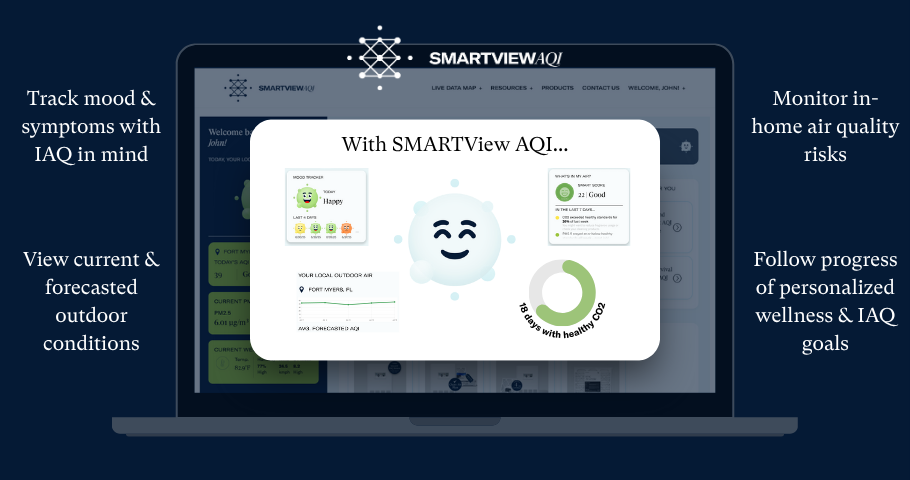CO2 and Focus: How CO2 Levels Impact Focus, Mood, and Mental Clarity at Home
If you’ve ever felt foggy, irritable, or unusually sluggish while working from home, it might not just be stress or screen fatigue. Poor indoor air quality—specifically high CO2 levels—could be quietly draining your focus, disrupting your mood, and lowering your mental clarity.
Understanding the relationship between CO2 and focus is key to unlocking a more productive, balanced, and clear-minded day at home. To maintain ideal carbon dioxide levels, homeowners should integrate smart ventilation habits, a balanced diet for brain health, and mindful air practices throughout the day.
Why Indoor CO2 Builds Up More Than You Think
Unlike visible dust or odors, carbon dioxide (CO2) is odorless and invisible. It accumulates indoors from human breath, especially in tightly sealed, energy-efficient homes. When ventilation is low and multiple people occupy a space—like a home office, bedroom, or kitchen—CO2 can spike to 1,000 ppm or more, well above the typical outdoor level of ~400 ppm.
This prolonged CO2 exposure can subtly impair mental clarity, increase cortisol levels, disrupt sleep, and contribute to cognitive decline over time, causing the correlation between CO2 and focus. For an overview of CO2 and health impacts, visit the EPA Indoor Air Quality Basics.
CO2 and Focus: The Cognitive Connection
Studies—like Studies—like Harvard’s Healthy Buildings project—show that even moderate CO2 elevations can slow reaction times, impair decision-making, and reduce concentration. Elevated CO2 can worsen brain fog, making simple tasks feel mentally draining. This effectively links CO2 and focus, mental clarity, and mental health—a triad too important to ignore.
You can explore more about cognitive symptoms on the Mayo Clinic’s page on Mild Cognitive Impairment. performance take a noticeable hit.

Stale Air Symptoms You Might Be Ignoring
Subtle signs of poor air quality can affect your mental health and daily performance:
- Headaches and minor memory issues
- Daytime drowsiness
- Irritability or brain fog
- Difficulty concentrating
- Slightly heightened cortisol levels, leading to stress
These stale air symptoms are often mistaken for fatigue or dehydration. A smart air quality monitor with sensor data tracking CO2, VOCs, and PM2.5 can alert you before your mental clarity suffers.
Diet & Indoor Air: A Surprising Connection to CO2 and Focus
Eating for mental health isn’t just about nutrients—high-CO2 environments can tip your metabolism toward stress, affecting cortisol and energy levels.
Pairing a balanced diet rich in antioxidants, healthy fats, and fiber with clean air strategies supports both mental clarity and emotional resilience. This combination can also help reduce symptoms of brain fog often triggered by poor air quality and low oxygen availability.
When AQI Affects IAQ (And Your Brain)
Understanding the difference between AQI vs IAQ isn’t just a simple comparison—it directly impacts your brain health.
- Outdoor pollution spikes (high AQI) can penetrate indoors, raising PM2.5 even when your CO2 is fine.
- In sealed, polluted environments, cortisol levels may rise with CO2 and VOCs.
- Reducing indoor pollutants complements low AQI for maximum focus.
To truly optimize your mental clarity, you must monitor both AQI and IAQ.
SMARTView AQI: Your Real-Time Air & Brain Health Tool
Meet SMARTView AQI—a unified platform that visualizes indoor CO2, VOCs, PM2.5, and outdoor AQI all in one place. With real-time sensor data, SMARTView helps you:
- Identify CO2 spikes before brain fog sets in
- Track indoor and outdoor air quality trends, outdoor pollution, and ventilation adjustments
- Correlate cortisol levels (suggested by symptoms) with air conditions
- Support mental health through data-driven air therapy and wellness tracking
Pair SMARTView with simple lifestyle shifts and you’ve got a powerful toolkit for sustained mental clarity.

How to Reduce CO2 Indoors and Boost Mental Clarity
1. Monitor CO2 + Air Quality:
Use an air quality monitor paired with SMARTView AQI. See indoor CO2 and outdoor AQI at a glance.
2. Ventilate Smartly:
Open windows early or late when AQI is low. Cross-ventilation flushes stale air most efficiently.
3. Use CO2-Sensitive Tech:
Invest in HVAC systems or purifiers that respond automatically to rising CO2—this supports indoor pollutants control and keeps air fresh.
4. Relieve Stress and Boost Mood:
Take micro-breaks to declutter your mind and your air. Step outside to reset your cortisol levels and reduce brain fog.
5. Nourish for Focus:
Opt for a balanced diet rich in omega-3s, antioxidants, and greens. Coupled with clean air, you’re creating a powerful brain-support system.
6. Add Indoor Plants:
While plants alone won’t reduce CO2 dramatically, their presence supports air refreshment, reduces VOCs, and fosters mental clarity.
7. Track Results with SMARTView:
Document your cognitive performance, mood, and SMARTView data daily. Notice improvements in mental clarity as HVAC or ventilation settings change.
Bonus Tips for Deeper Mental Health Support
- Schedule “deep work” sessions when CO2 is lowest
- Use timed breathing or meditation during upward CO2 trends
- Set reminders via your SMARTView AQI dashboard to ventilate hourly
Why Sleep & Air Quality Are Linked: How CO2 affects sleep
Your mental health and mental clarity during the day depend heavily on sleep—and poor IAQ disrupts both.
High nighttime CO2 can raise cortisol, cause sleep fragmentation, contribute to brain fog, and reduce REM—a triple threat to cognitive decline. To improve sleep:
- Keep bedroom doors closed, purify air overnight with low-noise airflow
- Ventilate briefly before bedtime
- Monitor overnight CO2 trends via SMARTView AQI to know if your air is affecting rest
Clear your mind as you clear the air
Cognitive performance, concentration, mood, and mental clarity are deeply influenced by the air we breathe. When CO2 levels, indoor pollutants, and poor ventilation collide, stress and cognitive decline follow. A balanced diet and SMARTView AQI technology together help maintain healthy cortisol, brain function, and mental health.
Don’t just survive your day—thrive through it. With clean air, smart nutrition, and real-time insights, your mind can reach its peak.
